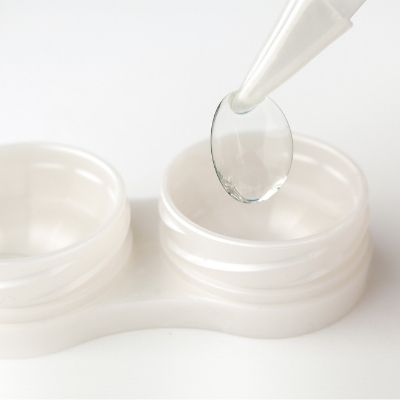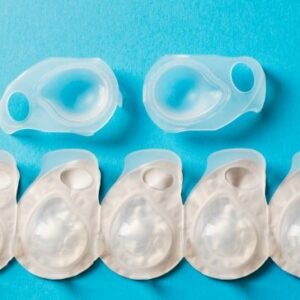If you wear contacts then the last thing you want to hear is that you can be allergic to them. Seasonal, food, and animal allergies are bad enough, but your contacts are an essential part of your everyday life. You need to know if it’s possible to be allergic to contacts and what you can do about it.
It is true that you can be allergic to contact lenses. Fortunately, this is very rare with more people being allergic to their contact lens solution. Contact lens allergies can lead to giant papillary conjunctivitis which causes bumps to grow under your eyelid. It can be treated in a number of ways, but your best choice is to switch to daily lenses.
Can You Be Allergic to Contacts?
It may come as a surprise to many that yes, you can be allergic to your contact lenses, contact solution, or both. Most people who experience these allergies are only allergic to their contact lens solution. However, there are rare cases where people develop an actual contact lens allergy.
Allergies to Contact Lens Solution
Having an allergy to your contact lens solution is more common than being allergic to your contact lenses. This can occur due to the preservatives used in some solutions. Soft contact lenses can actually absorb the solution and gas-permeable lenses can be coated in them, causing your eye to become irritated when you wear them.
According to Tufts Medical Center, you can have an allergic reaction to contact lens solution even if you’ve used the same one for years. In fact, many people who develop an allergy had no previous history beforehand. This can cause your eyes to become itchy, watery, and red.
Your best bet is to use products that have been labeled either “thimerosal-free” or for “sensitive eyes.” You can also talk to your eye doctor about which ingredients may be causing your reaction and avoid products with them on the label. Dr. Travis Thompson and Dr. Catherine Abbott can recommend products that protect your eye health as well as overall health.
Giant Papillary Conjunctivitis
People who have an allergic reaction to their contacts or contact lens solution suffer from giant papillary conjunctivitis (GPC). Like regular conjunctivitis (pink eye), GPC results in allergy symptoms such as:
- Redness
- Pain
- Itchiness
- Feeling like a foreign object is in your eye
However, this eye allergy has the added symptom of tiny round bumps or lesions on the inside of your eyelid. This causes sufferers to feel increased sensitivity that can actually become worse when the contact is taken out. This is because the protective barrier of the lens has been removed, resulting in increased eye irritation from the bumps inside the eyelid.
Click here to learn about the five issues commonly mistaken for conjunctivitis!
Causes
You can experience GPC with almost any type of contact lens. This is for a couple of reasons.
- Allergens such as pollen and other irritants build up on the lenses
- Your body considers the lenses a foreign object
These factors cause your immune system to produce a protective response. It does this by releasing histamines and other chemicals in order to defend itself, creating the symptoms we associate with eye allergies.
Diagnosing GPC
There isn’t a standard lab test for diagnosing GPC. While some may screen tears for high levels of immunoglobulin E (IgE), your eye doctor will likely examine underneath your eyelid. They can use the size of the lesions and your history of wearing contact lenses to tell if you have GPC. They may also look at how your lenses move when you blink to gauge eye deposit buildup.
Treating GPC
You should contact your eye doctor immediately if you suspect you have GPC. If left untreated, you run the risk of serious damage to your cornea and eyelid which can have long-term effects on your vision. Dr. Travis Thompson and Dr. Catherine Abbott will be able to provide you with the eye care you need to protect your vision and eye health.
Switch to Daily Contacts
Also known as disposable contact lenses, daily contacts help prevent GPC by stopping residue from building up in the first place. This is because they’re designed to be thrown away every evening after they’re worn and replaced with a new pair in the morning. This way, you don’t have to worry about using the right cleaning solution and worrying if you stored your contacts correctly.
Click here to learn more about the differences between daily and monthly contact lenses!
Contact lens care is critical if you wear contacts. It helps prevent contaminants from building up and growing on your lenses and protecting your eyes. Unfortunately, cleaning solutions can remove a lot of debris and residue, but not all of them. This is why you still need to clean them even if you wear contact lenses designed to be reused and eventually replaced, such as monthly lenses.
As a contact lens wearer, it’s your responsibility to make sure that your lenses stay as clean as possible until they’re replaced. Failure to do so may cause you to develop an allergy or even get an infection. With daily disposable contact lenses, you don’t have to worry about cleaning your contacts correctly again. You get a fresh pair every day ensuring your safety and comfort.
Other Treatments
Your eye doctor may recommend removing your contacts for a while in order to give the inner eyelid time to heal. If more treatment is necessary, they may prescribe you medicated eye drops, ointment, or artificial tears to help relieve the itching and swelling. You can also use cold compresses for relief from these frustrating symptoms.
Another good idea is to switch to glasses while you’re trying to determine the cause of your eye irritation. At Hardin Valley Eyecare & Optical, we offer a wide selection of frames to suit your needs and style.
Are you suffering from an allergic reaction to your contact lenses? Contact us today to learn more about how daily lenses can help!
You can be allergic to your contact lenses as well as your contact lens solution. While rare, a contact lens allergy is known as giant papillary conjunctivitis. This condition causes bumps or lesions to grow under the eyelid and irritate your eye. Different treatments are available, but your best option to keep wearing contacts is to switch to daily contact lenses.
Hardin Valley Eyecare & Optical has been serving Knoxville since 2009. Dr. Travis Thompson and Dr. Catherine Abbott specialize in the diagnosis and treatment of a wide array of eye diseases, conditions, and problems and are committed to improving the quality of life in the Knoxville community through enhanced vision. Located at 10904 Spring Bluff Way, you can schedule an appointment online or give us a call at (865) 888-0892.





